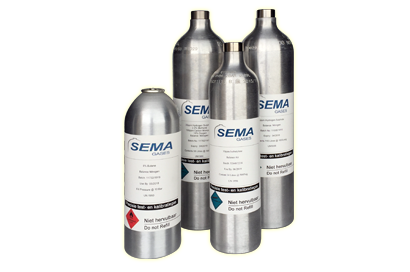
Vinyl Chloride (VCM) (C2H3Cl)
Vinyl chloride is an organochloride with the formula H2C=CHCl that is also called vinyl chloride monomer (VCM) or chloroethene. This colorless compound is an important industrial chemical chiefly used to produce the polymer polyvinyl chloride (PVC). About 13 billion kilograms are produced annually. VCM is among the top twenty largest petrochemicals (petroleum-derived chemicals) in world production. Vinyl chloride is a gas with a sweet odor. It is highly toxic, flammable, and carcinogenic. It can be formed in the environment when soil organisms break down chlorinated solvents. Vinyl chloride that is released by industries or formed by the breakdown of other chlorinated chemicals can enter the air and drinking water supplies. Vinyl chloride is a common contaminant found near landfills. In the past VCM was used as a refrigerant.
SEMA Gases is a manufacturer of span gases in disposable cylinder cans from the Netherlands, established from the want to create a label which is applicable for all brands of gas detection equipment. The products of SEMA Gases are used for calibration of portable gas detection instruments and calibration of fixed gas detection systems. SEMA Gases produces single gases (flammable gases, oxygen, toxic gases) and gas mixtures (2, 3, 4 or 5 gas mixtures) in various cylinder size up to 110 ltr.
Vinyl Chloride Calibration Gases
| 34L | 58L | 110L | Cert. tol. | Prod. tol. | Stability (months) |
|
|---|---|---|---|---|---|---|
| 10 ppm Vinyl Chloride // Nitrogen | Available | Available | Available | +/- 10% | +/- 20% | 60 |
